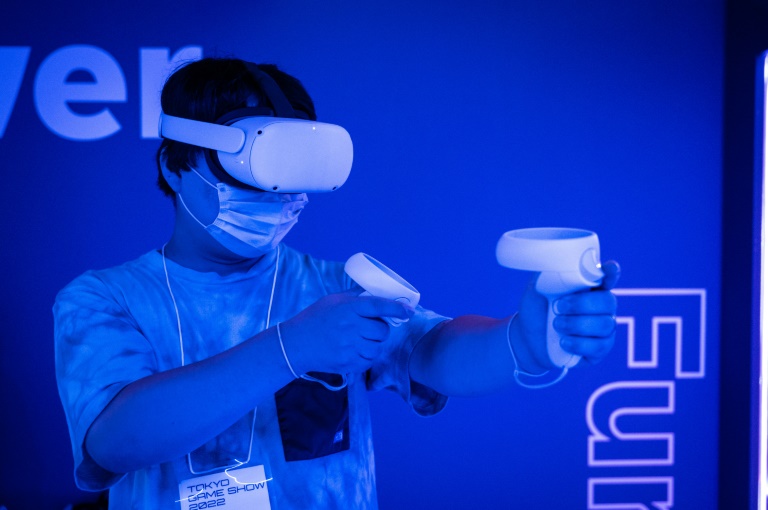イギリス

Yuichi YAMAZAKI/AFP
The metaverse and AI-powered chatbots are taking the UK shopping experience by storm, with consumers seeking Augmented Reality (AR) product information and embracing virtual engagement with brands during their buying journeys, as revealed by Akeneo’s latest research.
According to Akeneo’s ‘2023 B2C Survey: Product Experience Satisfaction Around the World‘ report, 69 per cent of UK consumers are now interested in utilising Augmented Reality (AR) to access product information, representing a year-on-year increase of 27 per cent.
As the metaverse becomes more mainstream, its adoption by UK shoppers is also on the rise. The Retail Technology Show’s data indicated that 42 per cent of Gen Z shoppers are now engaging with brands via web3, and KPMG’s latest poll revealed that 47 per cent of UK consumers believe the metaverse will be widely adopted in the next 10 years.
Despite some retailers withdrawing from the metaverse, such as Walmart, which pulled its Universe of Playspace on Roblox after a six-month trial, other retailers and brands, such as H&M, which launched its Stranger Things collection on its Looptopia Roblox experience in May, continue to build and grow their virtual presence within the next retail dimension.
Additionally, the popularity of AI-powered chatbots is skyrocketing, driven by the launch of OpenAI’s ChatGPT app in the UK in November 2022. ChatGPT’s impressive reach of 100 million users within two months of launch spurred Google to introduce its own rival AI chatbot, Bard, in March 2023. Other tech giants like Microsoft and Anthropic have also launched their AI chatbots.
Akeneo’s poll reflected the increasing demand for chatbot-generated product information, with 59 per cent of UK consumers now expecting chatbot engagement during their shopping journeys, marking a year-on-year increase of 22 per cent.
Kristin Naragon, Chief Strategy and Marketing Officer at Akeneo disclosed that while it is clear that consumers are quickly adopting new virtual or AI-driven ways to engage with brands in the discovery stage of their purchasing journeys, businesses should not overlook the significance of providing a cohesive omnichannel product experience.
Naragon stressed that to ensure that consumers stick with a particular business on the path to purchase, the products’ stories must appear everywhere shoppers go; otherwise, such businesses risk failing to deliver on their customer experience (CX) promise, which could result in lost sales and repeat purchase opportunities.
On a broader scale, an Ipsos survey also revealed the general sentiment around the adoption of artificial intelligence (AI). It pointed out that one in every three workers believes AI would result in the loss of their current employment. According to the global research survey, which questioned 22,816 people about their attitudes toward artificial intelligence, over half of adults (52%) are apprehensive about products and services that incorporate AI as they are enthused about them (54%).
The majority of individuals polled across all countries believe AI-powered products and services will significantly alter their daily lives in the next few years. On average, 57 per cent of workers anticipate that AI will affect the way they conduct their present job, while 36 per cent anticipate that it will replace their existing job.
In the 31 countries polled, two-thirds (67%) feel they have a decent understanding of what AI is, yet just half (51%) know which products and services employ AI.
Only around half of respondents (54%) believe AI-based services have more benefits than negatives and are excited about them. However, roughly the same proportion (52%) are concerned about AI-based products and services.
Younger people, men, those who are employed, more educated, and/or more affluent exhibit a better understanding of which products and services use AI, the report revealed.
Sjuul van der Leeuw, CEO of Deployteq, acknowledged the transformative impact of AI on businesses. The CEO noted its potential to enhance efficiency and revolutionise traditional job roles. However, van der Leeuw emphasised that the focus should be on using AI to optimise and empower workers, rather than replacing them.
Van der Leeuw continued: “For example, the use of generative AI and automation is already enabling the creative industries to produce incredible campaigns, overhauling traditional sales and marketing processes, and ushering in a new era of AI-backed creativity led by people rather than machines.”
© Copyright IBTimes 2023. All rights reserved.



